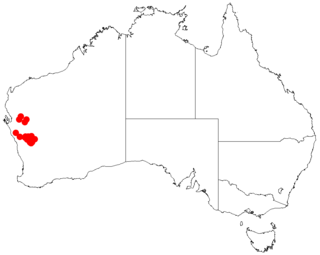
Acacia colei is a perennial bush or tree native to northern Australia and southern Asia. A common name for it is Cole's wattle. Acacia colei blooms from May through September and the flowers are bright yellow.

Acacia aptaneura, commonly known as slender mulga, is a shrub belonging to the genus Acacia and the subgenus Juliflorae. It is native to central and western parts of Australia.

Acacia conniana is a shrub belonging to the genus Acacia and the subgenus Juliflorae that is endemic to the southern coast of western Australia.

Acacia incognita, also known as false sugar brother, is a shrub or tree belonging to the genus Acacia and the subgenus Juliflorae that is endemic to Western Australia.

Acacia resinimarginea is a tree or shrub belonging to the genus Acacia and the subgenus Juliflorae that is endemic to western Australia.

Acacia tetraneura is a shrub belonging to the genus Acacia and the subgenus Juliflorae that is endemic to western Australia.

Acacia yorkrakinensis is a shrub belonging to the genus Acacia and the subgenus Juliflorae that is native to Western Australia.

Acacia ascendens is a shrub of the genus Acacia and the subgenus Plurinerves that is endemic to a small area in south western Australia.

Acacia aulacophylla is a shrub of the genus Acacia and the subgenus Plurinerves that is endemic to western Australia.

Acacia cassicula is a shrub of the genus Acacia and the subgenus Plurinerves that is endemic to an area of south western Australia.
Acacia graciliformis, also known as Koolanooka Delicate wattle, is a shrub of the genus Acacia and the subgenus Plurinerves that is endemic to a small area in western Australia.

Acacia nivea is a shrub of the genus Acacia and the subgenus Plurinerves that is endemic to south western Australia.
Acacia papulosa is a shrub of the genus Acacia and the subgenus Plurinerves that is endemic to a small area along the south coast of south western Australia.
Acacia pelophila is a shrub of the genus Acacia and the subgenus Plurinerves that is endemic to a small area along the west coast of western Australia.

Acacia spongolitica is a shrub of the genus Acacia and the subgenus Plurinerves that is endemic to south western Australia.

Acacia trulliformis is a shrub of the genus Acacia and the subgenus Plurinerves that is endemic to an area of south western Australia.

Acacia undosa is a shrub of the genus Acacia and the subgenus Plurinerves that is endemic to an area of south western Australia.

Acacia veronica, commonly known as Veronica's wattle, is a shrub or tree of the genus Acacia and the subgenus Plurinerves that is endemic to a small area of south western Australia.

Acacia vittata, commonly known as Lake Logue wattle, is a shrub of the genus Acacia and the subgenus Plurinerves that is endemic to a small area in western Australia.

Acacia handonis, commonly known as Hando's wattle or Percy Grant wattle, is a shrub belonging to the genus Acacia and the subgenus Phyllodineae that is native to parts of north eastern Australia. In 2008 it was listed as vulnerable according to the Environment Protection and Biodiversity Conservation Act 1999.


















